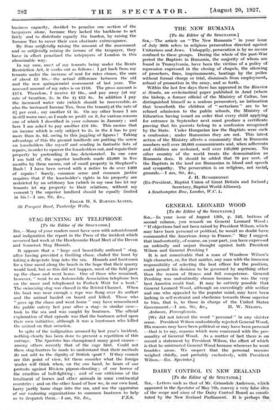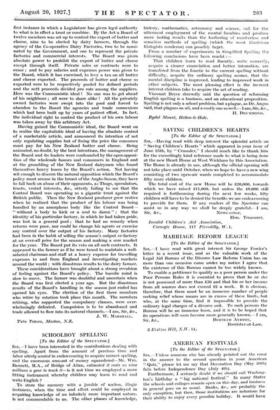DAIRY CONTROL IN NEW ZEALAND
[To the Editor of the SPEcrAT014 Sia,—Letters such as that of Mr. Grimsdale Anderson, Which' appeared in the Spectator of May 7th, convey 'a very false idea of the scope and-aims of the Dairy Control Board as eoniti- tuted by the New Zealand Parliament: It is perhaps the
first instance in which a Legislature has given legal authority to what is in effect a trust or combine. By the Act a Board of twelve members was set up to control the export of butter and cheese, nine to be elected by dairy farmers, through the agency of the Co-operative Dairy Factories, two to be nomi- nated by the Government, and one to represent the private factories and commercial interests. The Board was given absolute power to prohibit the export of butter and cheese except through itself. Private sales or contracts were to cease ; and to pay salaries and expenses power was given to the Board, which it has exercised, to levy a tax on all butter and cheese exported. The proceeds of butter and cheese so exported were to be respectively pooled for defined periods and the nett proceeds divided pro rata among the suppliers. Here was the Communistic ideal ! No one was to get ahead of his neighbour ; all were to share alike ! All the privately owned factories were swept into the pool and forced to abandon to the Board the agencies and trade connexions which had been built up by years of patient effort. In fact, the individual right to control the product of his own labour was taken away by this arbitrary Act.
Having gained the Communistic ideal, the Board went on to realize the capitalistic ideal of having the absolute control of a marketable article, and announced its intention of not only regulating supplies but of fixing the price the consumer must pay for his New Zealand butter and cheese. Being animated, no doubt, by the best intentions, the management of the Board and its leaders were confounded by the open opposi- tion of the wholesale houses and consumers in England and at the grumbling of the New Zealand dairymen who found themselves heavy losers by the Board's action, Not having wit enough to discern the natural opposition which the Board's policy must arouse in the breast of the Anglo-Saxon, they have to fall back on abuse of their opponents, as Thugs, speculators, trusts, vested interests, &c., utterly failing to see that the Control Board was operating as a gigantic trust against the British public. Then the New Zealand producer grew restive when he realized that the product of his labour was being handled by an amorphous body like the Control Board- " without a body to kick or a soul to damn " ; that the identity of his particular factory, in which he had taken pride, was lost in a general pool ; that he had no remedy when returns were poor, nor could he change his agents or exercise any control over the output of his factory. Many factories had been in the habit of selling the season's output ex-factory at an over-all price for the season and making a sure market for the year. The Board put its veto on all such contracts. It appeared to the farmer as if he were taxed to maintain a well- salaried chairman and staff at a heavy expense for travelling expenses to and from England and investigating markets around the world ; with disastrous results to the dairy farmer.
These considerations have brought about a strong revulsion of feeling against the Board's policy. The bucolic mind is slow to move. The farmer was doubtful and uncertain when the Board was first elected a year ago. But the disastrous results of the Board's handling in the season just ended has opened his eyes. The election of the first three members who retire by rotation took place this month. The members retiring, who supported the compulsory clauses, were over- whelmingly defeated. Compulsion is to be abandoned and trade allowed to flow into its natural channels.—I am, Sir, &c., J. W. MARSHALL.
Tutu Totara, Marton, N.Z.



































 Previous page
Previous page